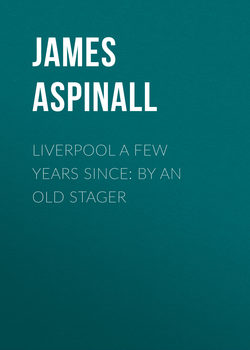Читать книгу Liverpool a few years since: by an old stager - James Aspinall - Страница 11
CHAPTER VIII
ОглавлениеIn Rodney-street, likewise, lived Fletcher Raincock, one of the most remarkable characters of his day. He had few equals in a legal capacity, and no superiors in literary attainments. He had a most gluttonous appetite for books, and read everything, old and new. He was a regular “curiosity shop” in the variety of his knowledge, and could produce all sorts of odds and ends at a moment’s notice, from all sorts of ancient authors, unknown to and never heard of by other people. This made him a most agreeable companion, his conversational powers being tremendous, and set off, rather than impaired, by a spice of originality and eccentricity, just enough to draw a line between him and the common herd of ordinary and every-day people by whom he was surrounded. Like Yorick, “he would set the table in a roar,” by the combined wit and wisdom which he had ever at command. And while speaking of lawyers, let us digress for a moment to mention another old giant of those times. We allude to Mr. Hargreaves, who was for some years the Recorder of Liverpool, a deep and profound lawyer, haud ulli veterum virtute secundus. He was succeeded by James Clarke, who lived to a much later date amongst us. Poor Clarke! We never thought him crushed down by the weight of legal lore which he carried. But he was a man given to books, and had learned much from them. A pleasant man in a party, too, he was, abounding in anecdote and the passing stories of the day. And, on one point, we must admit that he was unmatched. We never met with any one who possessed more shrewdness and knowledge of the world. He had thoroughly studied the volume of man as well as printed books, and we often point to his career as a proof of the usefulness of this knowledge. He had a remarkable coolness and calmness about his character, but we did once see him put into a regular “fix,” in his own court, by an obstreperous juryman, who would have a will of his own. A huge sailor and a small boy were being tried for stealing an immense piece of cable. The sailor threw it all upon the boy, and the Recorder, believing him, was charging the jury to the same effect, when one of them rising, and hitching up his trousers, commenced, “But, Mr. Recorder!” This was too much. Mr. Recorder, electrified with indignation at being so interrupted, looked his best thunderbolts at the remonstrant, who still, however, kept sturdily on his legs, muttering protests against the opinion of the bench. The spectators became excited and amused at such an unusual scene, and a titter went round the court. This only added fuel to the fire, and Mr. Recorder made another attempt to silence his persevering assailant. “I tell you,” he exclaimed, “that from the evidence, the boy must have been the culprit who carried off the cable; the law says so, and I say so.” But the obdurate juryman had not yet done. He instantly answered, “But, Mr. Recorder, I do not know what you and the law may tell me, but common sense tells me that that boy could not even lift that piece of cable from the ground, much less run away with it.” This was a poser with a vengeance. It was a new and original view of the case, which set all evidence at naught. The titter in the court grew into a regular burst of laughter, which nothing could check. The poor Recorder was fully nonplussed and nonsuited, and the jury acquitted the boy without a moment’s hesitation.
